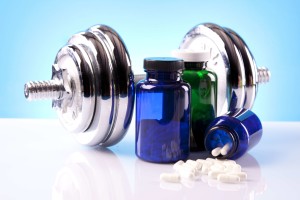Results. That’s the name of the game, right? If you talk with any competitor about what they hope to accomplish for the next show or season, they will inevitably use a variety of words to describe what is essentially an outcome or result. Typically, these descriptions include the following keywords: bigger, shredded, wider, tighter, leaner, and stronger.
 Interestingly enough, these same keywords show up in marketing and advertising campaigns for supplements. Why? Because people want results, and they want to understand the potential outcome or benefit that can be derived from using said product or service. It’s just human nature.
Interestingly enough, these same keywords show up in marketing and advertising campaigns for supplements. Why? Because people want results, and they want to understand the potential outcome or benefit that can be derived from using said product or service. It’s just human nature.
As a sponsored athlete and professional marketer, it pains me to say this, but once you strip away marketing, endorsements and advertising, you are essentially left with a list of product ingredients. Good marketing will help you feel connected to the product, but it’s the ingredients that actually deliver the results you want.
When you take a hard look at the supplements industry, there are several product ingredients that bubble to the surface as must haves–at least in my opinion. The selected ingredients below are based upon the body of evidence that supports their clinical use.
#1 Whey protein
Protein is possibly one of the most researched “ingredients” around. Researchers have conducted countless studies to analyze, categorize and understand the essential and non-essential amino acids since they were first identified in the early 1800s.
Due to this extensive research, it is widely known that protein is necessary for muscle repair and synthesis. It is also widely accepted that athletes require more protein than an average person. In general, these higher amounts are 1 to 1.5 grams of protein per pound of bodyweight from all sources (e.g., whole foods and supplements).
Supplementation with whey protein is an ideal way to insure that adequate protein is consumed. In fact, whey and its various formulations (e.g., hydrolyzed, protein isolate) are the most studied forms of supplemental dietary protein. Depending upon diet, fitness goals and other factors (e.g., intolerability) there are several additional options of protein to choose from, including: casein, soy, egg, and pea, just to name a few.
#2 Creatine
Creatine is a naturally occurring acid that was discovered in 1832. Since its discovery, countless clinical studies have examined the safety and efficacy of this ingredient that is used as an energy source for muscles. Creatine is produced by amino acids primary found in the kidney and liver. Once formed, it is transported by the blood to active muscles that are in need.
Researchers have determined that creatine can produce mass gains in athletes when consumed in amounts that are 2 to 3 times higher than non-athletes. Supplementation of 5 to 20 grams per day has been proven to be safe and effective in both male and female athletes. It should be noted, that many of the studies of creatine were performed with creatine monohydrate, so be sure to read your product labels carefully.
#3 Glutamine
Glutamine is a naturally occurring, non-essential amino acid that is produced primarily by the stomach. Over the last 10-15 years, researchers have studied glutamine extensively as they have attempted to understand its role within the human body. These clinical trials have demonstrated that not only is glutamine important, but it becomes essential in certain situations, namely during illness and intense athletic training.
Glutamine is important for muscle, repair, muscle recovery and waste removal. During athletic training (e.g., weight training), glutamine stores are easily deleted, so supplementation is an effective way to insure that your body has what it needs to stimulate the repair and recovery process.
Generally speaking an athlete should consume 10 to 15 grams of glutamine per day from all sources (e.g., whole foods and supplements). Ideally, glutamine supplements should be consumed in the morning, after a workout and before bed.
If you are looking for results, you definitely want whey protein, creatine and glutamine in your toolbox..
 Supplement Judge Unbiased Supplement Reviews – Do they really work??
Supplement Judge Unbiased Supplement Reviews – Do they really work??




